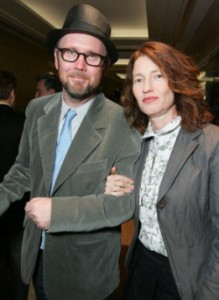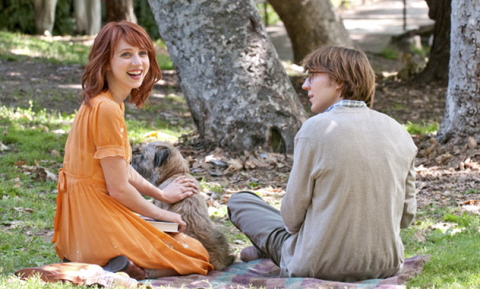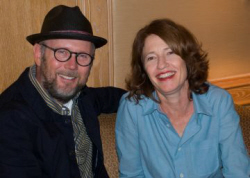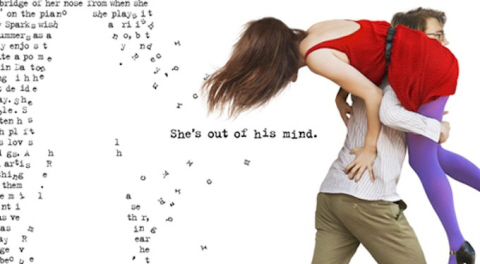 Six years is a long time to follow-up a hit, especially when that hit is Little Miss Sunshine. Most directors would cash in immediately and take the biggest payday offered, but Valerie Faris and Jonathan Dayton are not most directors.
Six years is a long time to follow-up a hit, especially when that hit is Little Miss Sunshine. Most directors would cash in immediately and take the biggest payday offered, but Valerie Faris and Jonathan Dayton are not most directors.
Their latest film, Ruby Sparks, is a beautifully intimate look at the modern relationship: a film that explores how we perceive our lovers versus the reality of their true selves. The duo is no stranger to relationship complexities as, besides being business partners, they also happen to be husband and wife. Many times in our interview, I discovered them completing each other’s sentences.
Refreshingly honest, they speak candidly on the difficulties involved in following up such a successful picture, and how artistic integrity was tantamount in any project they were too approach. Perhaps six years doesn’t seem so long when you’re spending a lifetime together.
Tim Kelly: So, you guys are married.
Valerie Faris & Jonathan Dayton: [simultaneously] Still!
TK: [laughs] Being in a business relationship and collaborating professionally, how does that inform a film with so many relationship complexities?
JD: We certainly know about the struggle for control in a relationship. We experience it at home and at work. But…
VF: But I think we value… we work. It is work to make a relationship successful. We’ve done it for over 20 years. I think we’re pretty conversant in the issues, the challenges of a relationship. What makes it work.
JD: I think the key is that we love what we do. We were really excited when we first read the script. We loved how it had this kind of science fiction premise, and yet they could cover all these very human issues.
VF: Yeah, at the heart of it it’s just a really good, human story. And I think that impulse to control things is something artists feel, but even everyone in our culture feels this need to control things. We were also just interested in that basic need. To have control over something and then when you get it, is it really something you want? That responsibility…
Interviewer: Going off that, what was the dynamic like on set? Having two couples (Valerie & Jon with Paul Dano & Zoe Kazan)…
JD: It was very normal. I think that when we’re working we all just come to it as professionals. So…
VF: We thought of it as working with Calvin and Ruby, so you take that part out of it. I think that it’s helpful because it was a very supportive environment and we’re all invested in the project. But we’ve done what we do for so many years, we don’t think about “We’re a couple working together.” It’s not on your mind.
I think, even for them, once you get focused on the work, those aspects are sort of secondary. You’re just thinking “How are we going to make our day today? Because we have to shoot these [scenes].” You’re under the gun and, on a production like this, you just don’t have time to think about all that stuff.

Interviewer: One of the major themes that I noticed in Little Miss Sunshine that was present here too was the “individual strive for greatness.” So, especially with the male individuals, you had Greg Kinnear and Steve Carell in Sunshine, and Calvin…
VF: You know, the kind of fear of failure, we have this need to be winners and be successful. And I think you’re always wrestling with “What does success mean on your own terms?” I think Calvin struggles with this pressure to produce another successful novel.
It’s one think to write another novel, but when you have that pressure of “This one has to be as good as the last one.” I think the two parallel stories are his relationship with Ruby and how that develops but also his ability to let go and write. If you try to control and go for perfection, it’s paralyzing.
JD: It wasn’t lost on us that we had made a hit movie and were looking to do our second. We identified with Calvin in that respect.
Interviewer: You had mentioned control. But I also thought one of the interesting sidebars is how much of your personality gets changed by your interactions with others. How did that translate in terms of you two being a couple and co-directing this?
 VF: We were also very interested in the idea that we each have an idea of the person we’re with versus who they are. So that there’s some sort of blurry line between the fictional version of that person and the real version. I think there’s a lot of fiction in most relationships. It’s part of what makes them work, that we imagine ourselves and the person we’re with in a somewhat glorified way. I think when it works, you do that.
VF: We were also very interested in the idea that we each have an idea of the person we’re with versus who they are. So that there’s some sort of blurry line between the fictional version of that person and the real version. I think there’s a lot of fiction in most relationships. It’s part of what makes them work, that we imagine ourselves and the person we’re with in a somewhat glorified way. I think when it works, you do that.
Calvin says in the movie, “Girls aren’t interested in me. They’re interested in some idea of me.” I think he felt what he imposes on Ruby later is, you think of him as this literary god, and there’s no way you can actually live up to that perception. So all those things are at play in this movie. How to reconcile the idea from this actual person…

TK: Little Miss Sunshine came out in 2006. You guys were working on projects in between, it wasn’t like this was the first project you tried to tackle. Are there challenges, particularly with indie successes, following up what was really part of the zeitgeist for its time? Are there challenges or pressures with a film like Ruby Sparks in that regard?
VF: We’ll see! [laughs]
JD: It’s interesting coming back again. Making Little Miss Sunshine and having it explode across the country and meeting and talking to people, you realize how much you don’t want to come back with something that’s terrible.
So all those years we worked on things that we really cared about. You know, making independent films is really harder than ever, unfortunately. I think they suffer the most from piracy issues. And a lot of indie filmmakers, Ben Miller…
VF: Alexander Payne…
JD: … Alexander. All these people, trying to make personal films. And those are tough to get through the machine.
VF: I think a lot of directors like us; we probably are a more controlling bunch. We want to have the actors that we want; we want our choices to be in the film. So it’s hard when you feel the pressure to cast someone because they have foreign sales or… I feel like it breaks down very often in casting.
And that’s where we were very lucky Fox Searchlight wanted to make this film. We had worked with them before on Little Miss Sunshine. They were supportive and let us make our own film.
JD: They gave us final cut.
TK: Nice, wow.
JD: So we thought, to make the movie we wanted… we’re not going to get rich doing these. We’re lucky, we get to make commercials and…
VF: … Make a living. And just do films when…
JD: …When the circumstances are right.
TK: So it’s artistic integrity then…
JD: That’s what’s important.
VF: And working as a couple, and to your earlier question, if we’re not doing something that we both love… What keeps us together is working on things that we really care about, and that’s kind of the key.
~
Always appreciative when we have the opportunity to sit down with two successful and engaging filmmakers.
Come back tomorrow when we speak to Ruby Sparks herself, Miss Zoe Kazan.